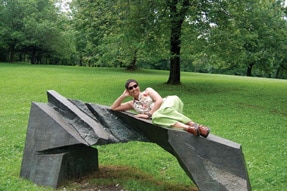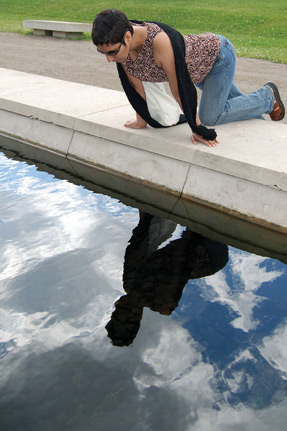| When I was a kid growing up in India, guests from America were always a huge deal.
“They’re here,” my father would whisper urgently as my mother rushed around the house with a lime room freshener, spraying randomly at the ceiling, phenyl-scrubbed floors and orange curtains. My sister and I would giggle into our hands as our parents nervously adjusted their smiles and reached for the door. The next few minutes were always chaotic. Hugs, exclamations, sometimes tears. Greetings were awkward — my father’s carefully cultivated Queen’s English jostling with the irreverent American drawl.
Our trademark hospitality always began at the door. My father would refuse to let his guests drag their bags to their rooms. He’d insist on carrying them. Sometimes, we puny girls would get caught in the squabble and end up pulling suitcases three times our size, our lanky cousins trailing behind, helpless and embarrassed. Luckily American luggage always came with wheels and smelled of cologne. My parents have always hosted guests quite effortlessly, but somehow the strapping America-returned relatives always looked out of sync in our living room and small bathrooms. Everything about them was bulky — shampoo bottles, yard-long towels, bulging duffel bags. Mealtimes were another big fuss. We’d usually gauge how Americanized our relatives had become at the dining table. Every dish was invariably too spicy, too sweet or too greasy. If my parents insisted that they take second or third helping, some would just look them in the eye and say no. Shopping with these global citizens was no fun either. They had this way of trivializing all the showrooms, restaurants or landmarks my sister and I were so proud of. There was always a better equivalent somewhere in America. They’d never notice the beautiful sari in the showroom, or the painting on the shelf. There was invariably an overflowing garbage can or an insistent beggar to annoy them. My mother’s carefully planned picnics were rarely appreciated. The soda was not properly chilled or there were too many mosquitoes. We could never compete with Disneyland or Grand Canyon or Central Park. When everything failed it fell on us sisters to amuse the guests. My father would make us recite passages from Shakespeare or Sanskrit verses from The Gita. Sometimes as I parroted through “Friends, Romans, countrymen, lend me your ears; I come to bury Caesar, not to praise him….” I heard muffled laughter. As I grew older, my amusement at this brand of foreign-returned guests turned to scorn. I felt fiercely protective of India and all things Indian in their company. I hated the pompous delight with which they “distributed” gifts. I hated even more, the adulation with which the Indian relatives received them, basking in “Made in USA” labels, synthetic skirts, Hershey’s chocolates and scarlet red lipsticks. When I turned 20, I swore on two things. One: I would not go to America. Two: If ever I traveled out of my country, I would return a gracious guest. But life has a strange sense of humor. I have been away from India for only seven years and I’m already becoming the guest I so passionately swore I would never become. When I traveled to India last February, the first thing that struck me when I landed in Delhi was the ubiquitous smell of dust, decomposing dumpsters and damp air. Even before I realized it, my hand flew to my nose. Somehow the city, where I have spent some of the best years of my life, felt unbearably claustrophobic. My friend, who had come to pick me up from the airport, chatted excitedly about the things she had planned for me. But all I heard or saw were the outstretched hands begging for money at every intersection. I felt ashamed of being “America-returned.” I resented how everyone eyed me keenly, looking for signs of Americanization. I felt guilty for asking everyone I visited to give me clean, boiled water. I felt I was insulting their hospitality, but I had to do it. It took me almost a week to settle down to the frenetic pace of India. I smiled secretly at the effort my mother had put into cleaning the house. I smelled the lime freshener in the air. It was my turn now. I was getting that special treatment reserved for guests from America. I even recited Julius Caesar to renew the bond with my father. And may I admit I looked a little too pleased with myself when I lay out the gifts? I felt strangely fulfilled when I saw my mother squeal over her trench coat and my sister strut the beige leather bag I gifted her. My father almost cried when I gave him Hamlet on tape.
Sadly, I had forgotten the fuss parents can make over the dinner table. I checked myself just in time. I almost blurted no, like those guests from America I so detested. It took me a while to unabashedly haggle while shopping, to relish the sweet smell of incense, which pervades most clothes stores, and to eat golgappas without worrying about being sick. By the time I became an agreeable guest, it was time to leave. I arrived in Arizona on a hot day in July. The silence at Sky Harbor Airport was deafening. I almost felt compelled to speak in whispers. I felt lost in the pink daze of the desert. I longed to be caressed by the chaos of home. For quite some time I missed home. I disliked the sanitized smell of America, the discreet distance between cars and people. It was then I realized I had become the perpetual outsider — an immigrant in America and the America-returned in India. This is my fate. I have since made peace with them — foreign-returned guests. |
Perpetual Outsider

